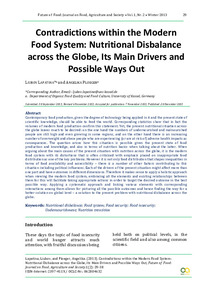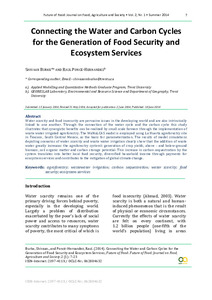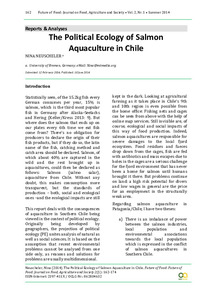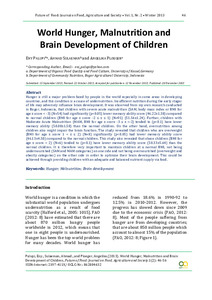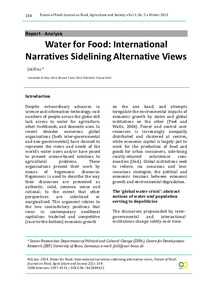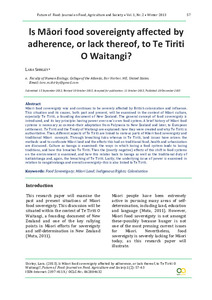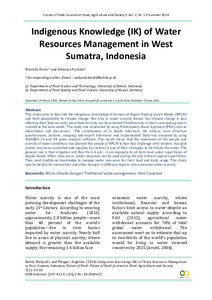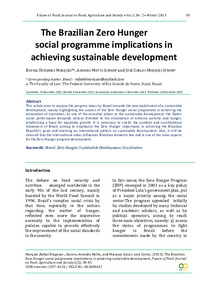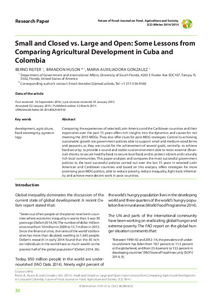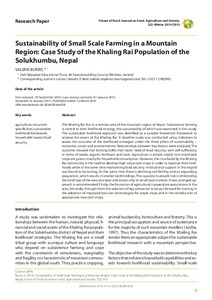Suche
Anzeige der Dokumente 31-40 von 97
Aufsatz
 Contradictions within the Modern Food System: Nutritional Disbalance across the Globe, Its Main Drivers and Possible Ways Out
Contradictions within the Modern Food System: Nutritional Disbalance across the Globe, Its Main Drivers and Possible Ways Out
(Department of Organic Food Quality and Food Culture at the University of Kassel, Germany and Federation of German Scientists (VDW), 2013-12-20)
Contemporary food production, given the degree of technology being applied in it and the present state of scientific knowledge, should be able to feed the world. Corresponding statistics show that in fact the volumes of modern food production confirm this statement. Yet, the present nutritional situation across the globe leaves much to be desired: on the one hand the numbers of undernourished and malnourished people are still high and even growing in some regions, and on the other hand there is an increasing number ...
Aufsatz
 Connecting the Water and Carbon Cycles for the Generation of Food Security and Ecosystem Services
Connecting the Water and Carbon Cycles for the Generation of Food Security and Ecosystem Services
(Department of Organic Food Quality and Food Culture at the University of Kassel, Germany and Federation of German Scientists (VDW), 2014-06-10)
Water scarcity and food insecurity are pervasive issues in the developing world and are also intrinsically linked to one another. Through the connection of the water cycle and the carbon cycle this study illustrates that synergistic benefits can be realized by small scale farmers through the implementation of waste water irrigated agroforestry. The WaNuLCAS model is employed using La Huerta agroforestry site in Texcoco, South Central Mexico, as the basis for parameterization. The results of model simulations depicting ...
Aufsatz
 The Political Ecology of Salmon Aquaculture in Chile
The Political Ecology of Salmon Aquaculture in Chile
(Department of Organic Food Quality and Food Culture at the University of Kassel, Germany and Federation of German Scientists (VDW), 2014-06-10)
Every German consumes per year, 15% is salmon, which is the third most popular fish in Germany after Alaska-Seelachs and Hering (Keller/Kress 2013: 9). But where does the salmon that ends up on our plates every 6th time we eat fish come from? There's no obligation for producers to declare the origin of their fish products, but if they do so, the latin name of the fish, catching method and catch area should be declared. Salmon, of which about 40% are captured in the wild and the rest brought up in aquacultures, could ...
Aufsatz
 World Hunger, Malnutrition and Brain Development of Children
World Hunger, Malnutrition and Brain Development of Children
(Department of Organic Food Quality and Food Culture at the University of Kassel, Germany and Federation of German Scientists (VDW), 2013-12-20)
Hunger is still a major problem faced by people in the world especially in some areas in developing countries, and this condition is a cause of undernutrition. Insufficient nutrition during the early stages of life may adversely influence brain development. It was observed from my own research conducted in Bogor, Indonesia, that children with severe acute malnutrition (SAM, body mass index or BMI for age z score < -3) (N=54) had significantly (p<0.05) lower memory ability score (46.22±1.38) compared to normal children ...
Aufsatz
 Water for Food: International Narratives Sidelining Alternative Views
Water for Food: International Narratives Sidelining Alternative Views
(Department of Organic Food Quality and Food Culture at the University of Kassel, Germany and Federation of German Scientists (VDW), 2014-06-10)
Aufsatz
 Is Māori food sovereignty affected by adherence, or lack thereof, to Te Tiriti O Waitangi?
Is Māori food sovereignty affected by adherence, or lack thereof, to Te Tiriti O Waitangi?
(Department of Organic Food Quality and Food Culture at the University of Kassel, Germany and Federation of German Scientists (VDW), 2013-12-20)
Māori food sovereignty was and continues to be severely affected by British colonisation and influence. This situation and its causes, both past and present, will be examined in the context of Māori culture, especially Te Tiriti, a founding document of New Zealand. The general concept of food sovereignty is introduced, and its key principle: having power over one's own food system. A brief history of Māori food systems is necessary as context–their adaptation from Polynesia to New Zealand and later, to European ...
Aufsatz
 Indigenous Knowledge (IK) of Water Resources Management in West Sumatra, Indonesia
Indigenous Knowledge (IK) of Water Resources Management in West Sumatra, Indonesia
(Department of Organic Food Quality and Food Culture at the University of Kassel, Germany and Federation of German Scientists (VDW), 2014-06-10)
This study was aim to describe the indigenous knowledge of farmers at Nagari Padang laweh Malalo (NPLM) and their adaptability to climate change. Not only the water scarcity is feared, but climate change is also affecting their food security. Local food security can be achieved if biodiversity in their surrounding area is suitable to the local needs. The study was conducted by using Participatory Rural Appraisal (PRA) such as observation and discussion. The combination of in depth interview, life history, semi structure ...
Aufsatz
 The Brazilian Zero Hunger social program implications in achieving sustainable development
The Brazilian Zero Hunger social program implications in achieving sustainable development
(Department of Organic Food Quality and Food Culture at the University of Kassel, Germany and Federation of German Scientists (VDW), 2013-12-20)
This article aims to analyse the progress taken by Brazil towards the accomplishment of a sustainable development, mainly highlighting the success of the Zero Hunger social programme in achieving the elimination of starvation. As one of the essential pillars to the sustainable development, the State’s social performance demands actions directed to the elimination of extreme poverty and hunger, establishing a basis for equitable growth. It is necessary to clarify the juridical and constitutional framework of Brazil, ...
Aufsatz
 Small and Closed vs. Large and Open: Some Lessons from Comparing Cuban to Colombian Agricultural Development
Small and Closed vs. Large and Open: Some Lessons from Comparing Cuban to Colombian Agricultural Development
(Department of Organic Food Quality and Food Culture at the University of Kassel, Germany and Federation of German Scientists (VDW), 2015-03-12)
Comparing the experiences of selected Latin America and the Caribbean countries and their trajectories over the past 15 years offers rich insights into the dynamics and causes for not meeting the 2015 MDGs. They also offer clues for post-MDG strategies. Central to achieving sustainable growth are government policies able to support small and medium-sized farms and peasants, as they are crucial for the achievement of several goals, centrally: to achieve food security; to provide a sound and stable rural environment ...
Aufsatz
 Sustainability of Small Scale Farming in a Mountain Region: Case Study of the Khaling Rai Population of the Solukhumbu, Nepal
Sustainability of Small Scale Farming in a Mountain Region: Case Study of the Khaling Rai Population of the Solukhumbu, Nepal
(Department of Organic Food Quality and Food Culture at the University of Kassel, Germany and Federation of German Scientists (VDW), 2015-03-12)
The Khaling Rai live in a remote area of the mountain region of Nepal. Subsistence farming is central to their livelihood strategy, the sustainability of which was examined in this study. The sustainable livelihood approach was identified as a suitable theoretical framework to analyse the assets of the Khaling Rai. A baseline study was conducted using indicators to assess the outcome of the livelihood strategies under the three pillars of sustainability – economic, social and environmental. Relationships between key ...

